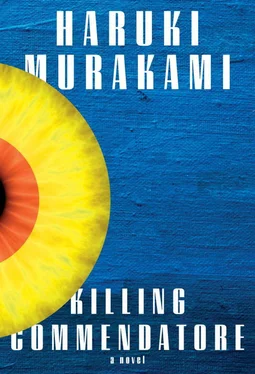“Nothing. Nobody’s there,” I said.
“Keep an eye out for a little longer,” she said. “Tell me if you see anything. Keep on talking like nothing’s happened.”
Our table looked out on the parking lot. I could see my decrepit, dusty little old Peugeot parked there. There were two other cars. A small silver compact, and a tall black minivan. The minivan looked new. They’d both been parked there for a while. No new cars had driven in. The woman must have walked. Or else someone gave her a ride here.
“Just passing through?” the woman asked.
“That’s right.”
“Are you on a trip?”
“You could say that,” I said.
“What kind of book are you reading?”
I showed her the book. It was Ogai Mori’s Abe Ichizoku, a samurai tale written over a hundred years before.
“ Abe Ichizoku ,” she intoned. She handed the book back. “How come you’re reading such an old book?”
“It was in the lounge of a youth hostel I stayed at in Aomori not long ago. I leafed through it, thought it was interesting, and took it with me. In exchange, I left a couple of books I’d finished reading.”
“I’ve never read Abe Ichizoku . Is it interesting?”
I’d read it once and was rereading it. The story was pretty interesting, but I couldn’t figure out why, and from what sort of stance, Ogai had written it, or felt compelled to write that kind of tale. But explaining that would take too long. This wasn’t a book club. And this woman was just bringing up random topics so our conversation seemed natural (or at least so that it looked that way to the people around us).
“It’s worth reading,” I said.
“So what sort of work?” she asked.
“You mean the novel?”
She frowned. “No. I don’t care about that. I mean you . What kind of work do you do for a living?”
“I paint pictures,” I said.
“You’re an artist,” she said.
“You could say that.”
“What sort of paintings?”
“Portraits,” I said.
“By portraits you mean those paintings you see hanging on the wall in the president’s office in companies? The ones where big shots look all full of themselves?”
“That’s right.”
“That’s your specialty?”
I nodded.
She said no more about painting. She might have lost interest. Most people in the world, unless they’re the ones being painted, have zero interest in portraits.
Right then the automatic door at the entrance slid open and a tall, middle-aged man came in. He had on a black leather jacket and a black golf cap with a golf company’s logo on it. He stood at the entrance, gave the whole diner a once-over, chose a table two over from ours, and sat down, facing us. He took off his cap, finger-combed his hair a couple of times, and carefully studied the menu the busty waitress brought over. His hair was cut short, and had some white mixed in. He was thin, with dark, suntanned skin. His forehead was lined with a series of deep, wavy wrinkles.
“A man just came in,” I told her.
“What does he look like?”
I gave her a quick description.
“Can you draw him?” she asked.
“You mean a likeness?”
“Yes. You’re an artist, aren’t you?”
I took a memo pad from my pocket, and, using a mechanical pencil, quickly sketched the man. Even added some shading. While I drew it I didn’t need to glance over at him. I have the ability to grasp the features of a person quickly and etch them into my memory. I passed the drawing across the table to her. She took it, and stared at it, eyes narrowed, for a long time, like a bank teller examining dubious handwriting on a check. Finally she laid the memo page on the table.
“You’re really good at drawing,” she said, looking at me. She sounded genuinely impressed.
“It’s what I do,” I said. “So, do you know this man?”
She didn’t reply, just shook her head. Her lips tight, her expression unchanged. She folded the drawing up twice, and stuffed it away in her shoulder bag. I couldn’t figure out why she would keep something like that. She should have just crumpled it up and thrown it away.
“I don’t know him,” she said.
“But you’re being followed by him. Is that what’s going on?”
She didn’t reply.
The same waitress brought over her coffee and cheesecake. The woman kept quiet until the waitress had left. She sliced a bite of the cheesecake with her fork, then pushed it from side to side on the plate. Like a hockey player practicing on the ice before a game. She finally put the piece in her mouth and, expressionless, chewed slowly. Once she finished it she poured a hint of cream into her coffee and took a sip. She nudged the plate with the cheesecake to one side, as if it was no longer needed.
A white SUV had joined the cars in the parking lot. A stocky, tall car, with solid-looking tires. Apparently driven by the man who’d just come in. He’d parked the car facing in, not backing into the spot as was more usual. On the cover of the spare tire attached to the luggage compartment were the words SUBARU FORESTER. I finished my shrimp curry. The waitress came over to take away the plate, and I ordered coffee.
“Have you been traveling for a long time?” the woman asked.
“It’ll be a long trip,” I said.
“Is it fun to travel?”
I’m not traveling for fun, is how I should have answered. But that would have made things long and complicated.
“Sort of,” I answered.
She stared at me, like studying some rare animal. “You sure are a man of few words.”
It depends on who I’m talking with, is how I should have answered. But going there would have also made things long and complicated.
The coffee came, and I drank some. It tasted like coffee, but it wasn’t all that good. But at least it was coffee, and piping hot. After this no other customers came in. The salt-and-pepper-haired man in the leather jacket, in a voice that carried, ordered a Salisbury steak and rice.
A string-section version of “Fool on the Hill” came over the sound system. Did John Lennon write that song, or Paul McCartney? I couldn’t remember. Probably Lennon. This kind of random thought rattled around in my head. I had no idea what else I should think about.
“Did you come here by car?”
“Um.”
“What kind of car?”
“A red Peugeot.”
“What district is the license plate?”
“Shinagawa,” I said.
Hearing that, she frowned, as if she had a bad memory associated with a red Peugeot with Shinagawa plates. She tugged down the sleeves of her cardigan and checked that the buttons on her white shirt were done all the way up. She wiped her mouth with a paper napkin. “Let’s go,” she suddenly said.
She drank a half glass of water and stood up. She left her coffee, only one sip taken, and cheesecake, only one bite taken, on the tabletop. Like the remains after a terrible natural disaster.
Not knowing where we were going, I stood up after her, took the bill from the table, and paid at the register. The woman’s order was included, but she didn’t say a word of thanks, or make a move to pay her share.
As we left, the man with the salt-and-pepper hair was eating his Salisbury steak, seemingly bored by it all. He looked up and glanced in our direction, but that was all. He looked down at his plate again and went on eating, with knife and fork, his face expressionless. The woman didn’t look at him at all.
As we passed by the white Subaru Forester, a bumper sticker on it with a picture of a fish caught my eye. Probably a marlin. Of course, I had no idea why he had to have a sticker with a marlin on it on his car. Maybe he worked in the fishing industry, or was a fisherman.
Читать дальше











